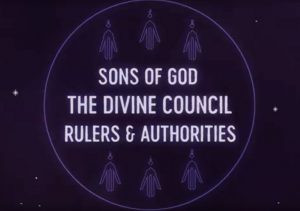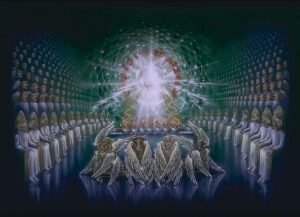
Shownotes
Welcome to Day 1456 of our Wisdom-Trek, and thank you for joining me.
I am Guthrie Chamberlain, Your Guide to Wisdom
Additional Objections To The Heavenly Council – Worldview Wednesday
Wisdom - the final frontier to true knowledge. Welcome to Wisdom-Trek! Where our mission is to create a legacy of wisdom, to seek out discernment and insights, to boldly grow where few have chosen to grow before. Hello, my friend, I am Guthrie Chamberlain, your captain on our journey to increase Wisdom and Create a Living Legacy. Thank you for joining us today as we explore wisdom on our 2nd millennium of podcasts. Today is Day 1456 of our Trek, and it is Worldview Wednesday. Creating a Biblical Worldview is essential to have a proper perspective on today’s current events. To establish a Biblical Worldview, you must have a proper understanding of God and His Word. This week, on our Worldview Wednesday episode, we will continue with our study based on a course I recently completed taught by Dr. Michael Heiser. Our study is titled “Sons and Daughters of God: The Believer’s Identity, Calling, and Destiny” Throughout this multi-week course we will demonstrate that, in the Old Testament, “sons of God” and “holy ones” refers to supernatural beings whose Father is God and who work with God to carry out His will and that this divine family was present before humanity. By fully engaging with biblical texts such as Psalm 82; Psalm 89, and Deuteronomy 32:8–9, our study will show that this divine family functions as a template for God’s human family. God desires of humans, as His imagers, to participate in His council. This study addresses issues such as polytheism, the nature of the (little ‘g’) “gods,” and the uniqueness of Yahweh. Within this study, we will apply insights to the New Testament texts and shows how the metaphor of being in God’s family informs our sense of identity and mission as believers.
Additional Objections To The Heavenly Council
· Segment 10: Are References Just People or Specifically Jews?
Who Comprises the Heavenly Council?
In previous weeks we explored if the council of God referred to the trinity or idols. Neither of those options were logical or based on Scripture. One of the other options when people raise the following questions, “Well, maybe these plural elohim aren’t really divine beings; they’re not really gods.” “Maybe they are something else. Maybe they are people.” “Maybe Psalm 82 has God talking to a council of leaders, Jewish leaders, elders, Israelites, you know, some human beings here.”
Coming from the Spiritual World
Now, we’ve already seen specific arguments in addressing other questions that are going to make this option very troublesome. Frankly, making this option impossible. In Psalm 89, the council of God, the council of His sons. In Psalm 82:6, the sons of God, the sons of the Most High. Those two psalms using sonship language very plainly—this council of God’s children in Psalm 89 is in the skies; it’s in the heavenly realms, the spiritual realm.
First Kings 22: Micaiah is looking into the throne room of God. Micaiah sees a vision of the spiritual world. It’s the same thing with Daniel 4 and Daniel 7. In these passages, these beings come from the spiritual world, not earth. That alone would rule out the trajectory that God is really talking to people here.
Dominant View: Humans
You can read your Bible from cover to cover, and you’re never going to come up with a group of Jewish people ruling with God in the skies. It just doesn’t make any sense. There is a reason behind why I am bringing this up because this is actually, believe it or not—even though after the little bit we have discussed here, it sounds a bit absurd—this is actually kind of a dominant view in commentaries and other sources for Psalm 82.
Again, it’s because people are troubled by having multiple elohim in the spiritual world. You might be listening to that and saying, “What’s the trouble? It’s a heavenly host.” I understand that, but again, we need to hit some of these things.

Jewish Elders Never Called Elohim
Dr. Heiser has included specific detailed critiques of this idea that Psalm 82 is just talking about other people in his best selling book, The Unseen Realm. For an even more in-depth analysis, I refer you to his book. Some defend Palms 82 & 89 as Jewish elders and compare them to Exodus 18. That passage is the scene where Moses, through the advice of the counsel of Jethro, appoints other people to help him make decisions—the appointment of elders to assist Moses in Israelite jurisprudence and handling less serious matters.
Well, the fact of the matter is, that’s true, but if you read Exodos 18, the elders are never called elohim in that passage, not even once. Every occurrence of elohim in that passage, except for one, refers to the God of Israel; the outlier is a reference to the other gods of the nations. Jewish elders are never referred to as elohim in either Exodos 18 or any other passage.
Spiritual Beings, Not Humans
What I want you to take away from this point here is that you don’t need to do all that fancy scholarly stuff. Think about Psalm 82, think about Psalm 89, think about 1 Kings 22, think about Daniel 4. God’s family, His children who form His council, or His advisory board, is not really in the sense of God learning anything. God allowing them to choose, make decisions, have a little freedom in carrying out things that God has already decided He wants to do. That body, that deliberative body, that group, are spiritual beings. They are in the spiritual realm, in the skies, in the heavens, according to Psalm 89. That alone rules out people.
Summary
So that’s the point really to take away from this for our purposes. If you want to get into the more extended, lengthier discussion, The Unseen Realm will do that for you. We are not hung up with divine plurality, and as we proceed through the rest of the questions, we’re going to get into: “Well, how do we think about the divine plurality if the answer isn’t these other things?” We are not dealing with polytheism here. The God of Israel is unique; none are like Him. There really is, comparatively speaking, none beside Him. He is unique.
So we don’t need to worry about that idea, and that in turn means we don’t have to invent contrived answers, contrived positions to explain divine plurality. I think you’re going to see as we proceed through the course that’s a good thing because God is going to use His relationship with His heavenly family and what they do as a template for helping us understand how God looks at us and what we do.
I will give you a sneak peek here. In the end, humans who are redeemed are going to be made like Him. 1 John 3, we are going to be made divine; we are going to be grafted into the divine family. There is a reason why we get a body like Jesus had, according to 1 Corinthians 15; there is a reason why we are described as being partakers of the divine nature in 2 Peter 1. The Old Testament language about the sons of God and what they do and how God relates to them is of great importance for understanding our status, our calling, and our destiny.
· Segment 11: Are References in Psalm 82 & 89 Just Angels?
“Angel” as Job Description
 We have one more common trajectory to address in terms of people trying to identify the plural elohim of Yahweh’s council in Psalm 82 and some of these other passages. The question naturally comes up, “Well, are these angels?” Well, it’s kind of like six of one and a half dozen of the other. The specific term for “angel” in the Hebrew Bible (mal’akh) is not used in these or other council passages. Heavenly host terminology, though, does show up, and of course, angels are part of the heavenly host.
We have one more common trajectory to address in terms of people trying to identify the plural elohim of Yahweh’s council in Psalm 82 and some of these other passages. The question naturally comes up, “Well, are these angels?” Well, it’s kind of like six of one and a half dozen of the other. The specific term for “angel” in the Hebrew Bible (mal’akh) is not used in these or other council passages. Heavenly host terminology, though, does show up, and of course, angels are part of the heavenly host.
What we have here is a bit of a confusion. We think of “angel” as a term that describes what something is. That’s not actually how we need to think about angels either in the Hebrew Bible or in other literature as well. An angel, a messenger, mal’akh in Hebrew just means “messenger”; angelos in Greek just means “messenger.” This term “angel” is actually a job description. It doesn’t tell you what a thing is; it tells you what a thing does. So, if we are referring to a certain elohim, certain divine beings as being mal’akhim (“angels”), it just means those particular elohim that’s their job for the day; they are taking a message somewhere.
“Sons of God” as Job Description
“Sons of God,” on the other hand, is also a job description. I mentioned earlier that it’s actually a hierarchical term. So, within the council, the biblical idea is that some of these council members take messages; those are the angels. Others, though, are referred to as “sons of God” in certain passages for specific reasons. It refers to a different task, different status in the hierarchy.
You have to think a little bit about the ancient Near Eastern world for this, and Dr. Heiser does this in Unseen Realm. He gives us a description with primary source references and all of that. “Sons of God” is really a royal household term, and in the book, he uses the example of Pharaoh. Pharaoh in both Egyptian and its later understanding, its transliteration as Pharaoh—Egyptian is per-aa; it means “great house” or “great household”—it actually refers to the inner circle or the high bureaucracy that runs Egypt.
Of course, you have one person at the center who is the king figure (what we call the Pharaoh), but this great household is really the ones who are tasked with the most important positions and the most important jobs. That’s the way we sort of need to think about sons of God. Yes, messengers/angels are part of the council, but it’s not correct to sort of make them one-to-one equivalent terms: elohim are angels.
Elohim Not a Job Description
Angel is a job description; elohim, on the other hand, tells us what a thing is, but angel tells us what a thing does. So messengers are part of the council, but we don’t want to equate that term with elohim. We’re going to talk a little bit about what elohim are in more detail as we proceed in subsequent weeks because we next week need to get into how this whole question of, well, isn’t this just polytheism? If we run around and use “gods” as part of our vocabulary, part of the vernacular as we talk about biblical theology, aren’t we just talking polytheistically? The answer is we’re not, and we’re going to see why as we understand what elohim actually means. Again, that’s a key term. Angel is not a complete equivalent because angel is a job description, but elohim is something different.[1]
That will finish our study for this week’s Worldview Wednesday. Tomorrow we will continue with our 3-minute Humor nugget that will provide you with a bit of cheer, which will help you to lighten up and live a rich and satisfying life. So encourage your friends and family to join us and then come along with us tomorrow for another day of ‘Wisdom-Trek, Creating a Legacy.’ If you would like to listen to any of our past 1455 treks or read the Wisdom Journal, they are available at Wisdom-Trek.com. I encourage you to subscribe to Wisdom-Trek on your favorite podcast player so that each day’s trek will be downloaded automatically.
If you would like to listen to any of our past 1455 treks or read the Wisdom Journal, they are available at Wisdom-Trek.com. I encourage you to subscribe to Wisdom-Trek on your favorite podcast player so that each day’s trek will be downloaded automatically.
Thank you so much for allowing me to be your guide, mentor, and, most of all, your friend as I serve you in through this Wisdom-Trek podcast and journal.
As we take this Trek together, let us always:
- Live Abundantly (Fully)
- Love Unconditionally
- Listen Intentionally
- Learn Continuously
- Lend to others Generously
- Lead with Integrity
- Leave a Living Legacy Each Day
I am Guthrie Chamberlain….reminding you to ’Keep Moving Forward,’ ‘Enjoy your Journey,’ and ‘Create a Great Day…Everyday’! See you Tomorrow!
[1] Heiser, M. S. (2019). Sons and Daughters of God: The Believer’s Identity, Calling, and Destiny. Bellingham, WA: Lexham Press.